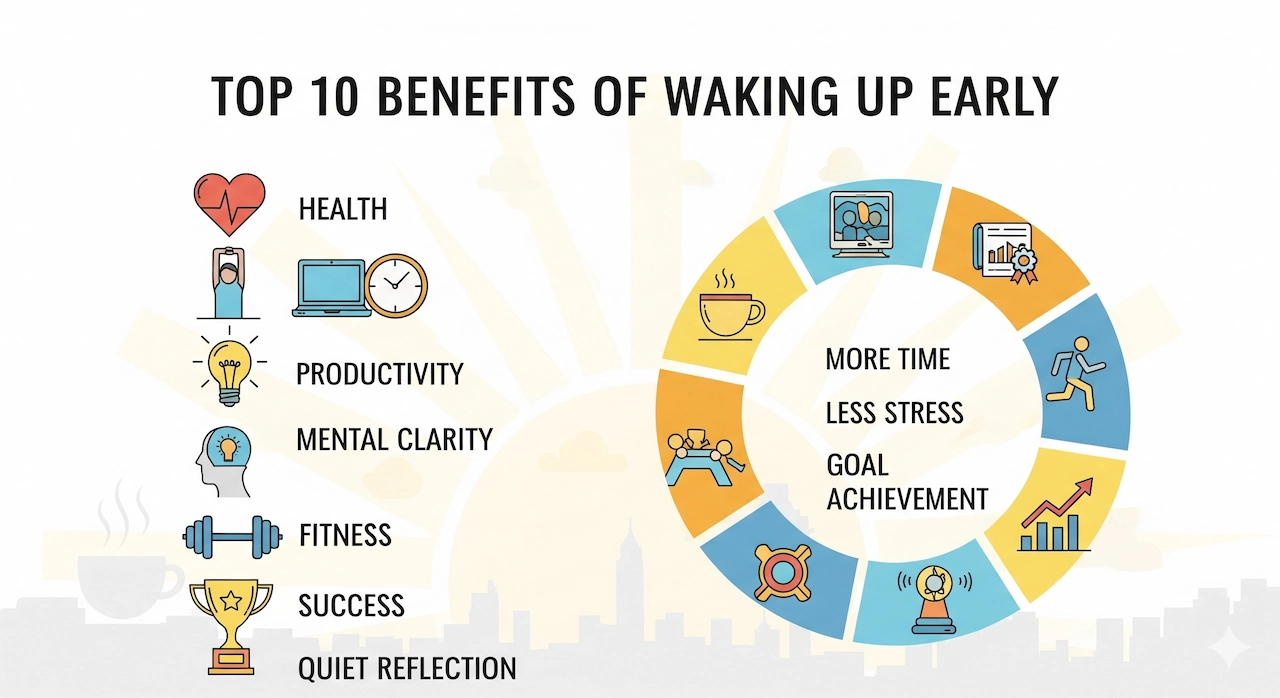Early rising has long been associated with discipline, productivity, and success. From spiritual leaders to modern CEOs, countless personalities credit their achievements to the habit of waking up early. But beyond inspiration and philosophy, science strongly supports the health and success benefits of early mornings. Studies show that early risers enjoy better mental health, enhanced productivity, and long-term wellness.
This article explores 10 scientific benefits of waking up early for success and health, combining psychology, neuroscience, and lifestyle research to explain why the early bird truly catches the worm.
1. Optimized Sleep Cycle and Better Rest

The human body runs on a circadian rhythm, a natural clock that regulates sleep and wakefulness. Research published by the National Institute of General Medical Sciences explains how aligning with sunrise and sunset enhances sleep quality.
Waking up early helps maintain a consistent sleep schedule, ensuring deeper REM sleep cycles. As a result, individuals who wake up early report feeling more rested and energized compared to late risers.
2. Reduced Daily Commotion and Time Pressure

Starting the day before the world gets busy reduces stress significantly. A study in the Journal of Applied Psychology suggests that morning calmness sets the tone for emotional stability throughout the day.
Early risers experience fewer distractions, giving them a peaceful environment to plan, exercise, or simply enjoy a quiet breakfast. This reduction in daily commotion directly lowers time pressure and boosts mental health.
3. Enhanced Mental Clarity and Reduced Stress

Morning hours are scientifically proven to be the most focused and distraction-free. Cortisol levels, which regulate alertness, naturally peak early in the morning. This makes early hours ideal for deep thinking, problem-solving, or creative tasks.
According to a report by the American Psychological Association, starting the day with calm routines like meditation, reading, or mindful breathing reduces anxiety and stress throughout the day.
4. Higher Productivity and Stronger Focus
The world’s most successful leaders, from Apple’s Tim Cook to PepsiCo’s Indra Nooyi, are known early risers. Science supports this habit—morning routines improve focus and willpower, which tend to deplete later in the day.
By waking early, individuals complete high-priority tasks before interruptions begin. This leads to stronger time management and improved career performance. This is one of the 10 Scientific Benefits of Waking Up Early.
5. Increased Physical Activity and Fitness
Morning exercise is closely linked to consistency. A study in the Journal of Physiology found that individuals who exercise in the morning have better adherence rates compared to evening exercisers.
Moreover, early workouts enhance metabolism, improve cardiovascular health, and elevate mood by releasing endorphins. This physical benefit translates into mental sharpness and long-term wellness.
6. Improved Nutrition and Healthier Eating Habits
Skipping breakfast is a common habit among late risers, often leading to unhealthy food choices later in the day. Research in the International Journal of Obesity found that morning people are more likely to eat balanced breakfasts, which stabilizes blood sugar and boosts energy.
Waking up early gives people time to prepare nutritious meals, preventing reliance on fast food or quick snacks. This is one of the 10 Scientific Benefits of Waking Up Early.
7. Stronger Academic and Professional Performance

Numerous studies link early rising with better grades and higher workplace performance. Students who wake up early score higher on standardized tests, according to research by Texas University.
Professionals benefit as well—early hours are associated with proactive planning, clear communication, and fewer missed deadlines, all of which are critical for career success.
8. More Time for Personal Growth and Hobbies
Waking up early offers extra hours that can be invested in self-improvement, hobbies, or learning. Studies in positive psychology reveal that dedicating time to personal interests improves emotional well-being and resilience.
Whether it’s reading, writing, meditation, or learning a new skill, early mornings provide a distraction-free window for growth.
9. Better Emotional Stability and Positivity
Morning routines improve mood regulation. A study in Emotion journal found that morning people report higher levels of optimism and satisfaction compared to night owls.
Exposure to morning sunlight also boosts serotonin levels, which regulate mood and reduce depression risks. Emotional stability directly impacts both professional success and personal happiness. This is one of the 10 Scientific Benefits of Waking Up Early.
10. Long-Term Health and Longevity Benefits

Waking early correlates with healthier lifestyles overall. Early risers are less likely to engage in late-night binge eating, smoking, or excessive screen time.
According to Harvard Health research, consistent sleep-wake cycles lower the risk of cardiovascular disease, obesity, and type 2 diabetes. Thus, waking up early is not only about productivity but also long-term health and longevity.
Conclusion
The science is clear: waking up early offers far-reaching benefits for both success and health. From improved sleep cycles and reduced stress to higher productivity and long-term well-being, early risers enjoy advantages that shape a balanced and fulfilling life.
While adopting this habit may require effort and discipline, the rewards are immense. By aligning with the body’s natural rhythms, embracing calm mornings, and using extra time wisely, anyone can transform their lifestyle. These practices truly highlight the Scientific Benefits of Waking Up Early, making it a simple yet powerful step toward long-term success and well-being.
So, the next time your alarm rings, remember: waking up early is not just a tradition—it’s a scientifically proven path to success and health.



